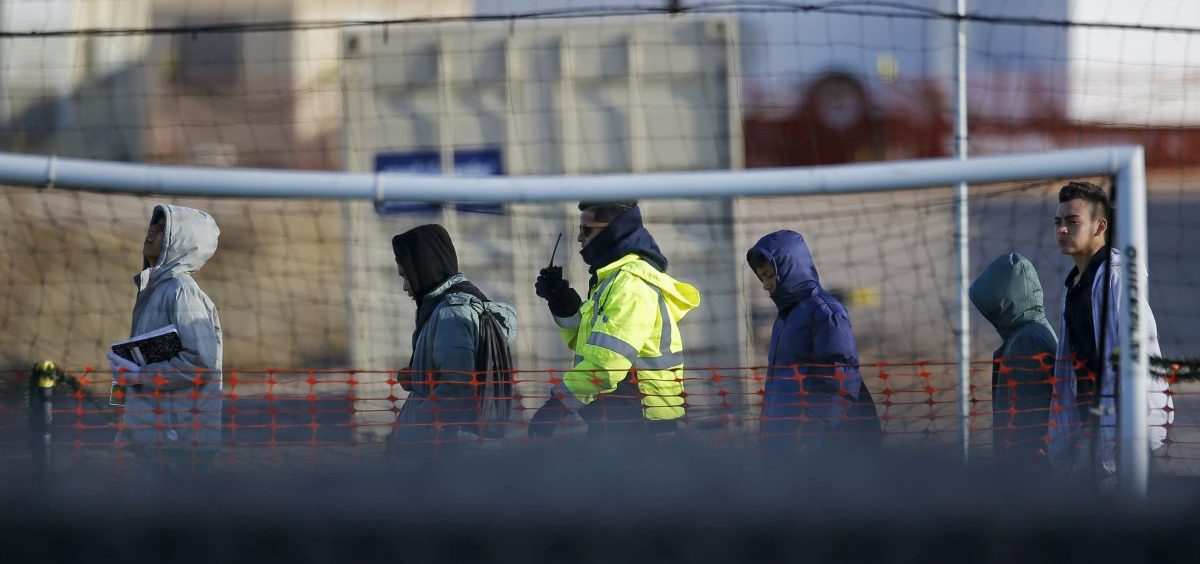News

Tent City Housing Migrant Children To Close As Kids Are Released To Sponsors
By: John Burnett | NPR
Posted on:
A controversial, government-contracted shelter for migrant children in the West Texas desert will shut down later this month, a result of sweeping changes to the rules that govern the custody of youngsters. Nationwide, the number of children in the government’s care has stopped growing and begun to fall. In the last two weeks, some 2,200 child migrants — mostly teenage boys from Central America — have been discharged from shelters and allowed to join family already in the U.S.
At the biggest shelter of them all — the tent city in Tornillo, Texas — they’re driving more than a hundred kids a day to the El Paso airport, to go be with their adult sponsors, said a senior official at the camp who asked not to be named because he wasn’t authorized to speak to reporters.
The Department of Health and Human Services confirms the population at Tornillo is down from nearly 3,000 last month to about 1,500 today. HHS is responsible for the care of migrant kids who arrive at the border without a parent or legal guardian. An HHS fact sheet states that no additional children will be placed at Tornillo.
“We all feel a sense of relief,” said the shelter official. He said he expects all of the children will be discharged by Jan. 15. BCFS, the San Antonio nonprofit that runs the sprawling camp, plans to vacate the bleak acreage by Jan. 31, when its contract runs out.
They’ve already begun to demobilize.
“I noticed one of the large tents being taken down, and as of yesterday another large tent is being taken down,” said Joshua Rubin. He’s a Brooklyn software developer turned immigrant activist who has been staying in an RV just outside the Tornillo gate. On his Facebook page, Witness: Tornillo, Rubin has posted photos of the shrinking tent city. “I’ve noticed a lot of bathroom trailers rolling out of there. They’ve rolled out dozens of mobile offices. And I see vans full of kids heading out. These are all really hopeful signs.”
Last month, the number of kids in HHS custody nationwide was approaching a record 15,000. The shelter network had surpassing 90 percent capacity. And BCFS was warning that Tornillo could not keep expanding.
More and more protesters were showing up at the fenceline to denounce the adolescent encampment. Child welfare advocates say holding youngsters in these refuges for weeks and months at a time — however well meaning the care— is deleterious to their physical and mental health.
HHS announced an abrupt rule change on Dec 18. The agency dropped a requirement that everyone in a sponsor’s household had to be fingerprinted and receive a criminal background check. That extra vetting slowed the discharge process. Now, only the adult sponsors are screened.
“The children should be home with their parents. The government makes lousy parents,” Lynn Johnson, HHS assistant secretary of the Administration for Children and Families, told NPR at the time.
With the recent releases of children, migrant advocates are cautiously hopeful. But they question why more of the 12,400 children who remain in the HHS shelter system have not been released. And they wonder why the government is closing Tornillo, but expanding another unlicensed emergency shelter in South Florida?
“If, in fact, the government is interested in releasing kids to sponsors in a more timely manner, there should be no reason for them to be expanding the beds at Homestead,” said Dr. Amy Cohen, a child psychologist in Los Angeles who works with migrant children.
HHS confirms that that a “temporary influx facility” built in a vacant Job Corps center in Homestead, Fla., is being expanded from 1,350 beds to 2,350 beds, beginning in mid-January. The shelter system still struggles to handle the continuing surge of migrant children. Customs and Border Protection reports that in November, an average of 176 “unaccompanied alien children” arrived daily at the Southwest border, and were taken into custody.
9(MDI4ODU1ODA1MDE0ODA3MTMyMDY2MTJiNQ000))

